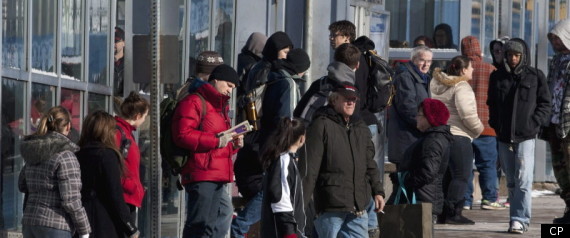If there is any doubt that Canadian workers are in for a tough year, consider the cluster of gloomy developments that have taken shape in recent days.
Though Canada’s job market emerged from the recession in a position of relative strength, Statistics Canada reported on Friday that job growth in January left much to be desired, with the economy adding just 2,300 jobs, a far cry from the 24,000 jobs analysts were expecting.
“This is a weak performance over the past six months,” says Benjamin Tal, deputy chief economist at CIBC World Markets, who notes that the rate of job growth hasn’t been this slow outside of a downturn since the 1970s.
Meanwhile, Illinois-based heavy equipment manufacturing giant Caterpillar ended a bitter lockout at its Electro-Motive Diesel plant in London, Ont., with an announcement that it will be shifting operations to its other facilities in North and South America, adding 700 skilled workers and managers to the city’s already lengthy unemployment rolls.
And in Toronto, where Mayor Rob Ford has made it his prerogative to “stop the gravy train” of presumably wasteful public spending, negotiations with the city’s outdoor workers stretched past the deadline set by negotiators. The deal reached well into the eleventh hour is said to have come at the expense of union concessions.
None of which has done much to inspire confidence among workers. Far from isolated incidents, experts say these occurrences reflect deeper labour market trends that are increasingly tipping the balance away from employees, and ratcheting up labour unrest.
“We’re seeing more and more evidence of very aggressive, take it or leave it approaches by employers,” says Charlotte Yates, dean of social sciences at McMaster University. “It’s ironic that we call it labour unrest instead of employer unrest, since the employers are the ones who are really being aggressive.”
Original Article
Source: Huff
Author: Rachel Mendleson
Though Canada’s job market emerged from the recession in a position of relative strength, Statistics Canada reported on Friday that job growth in January left much to be desired, with the economy adding just 2,300 jobs, a far cry from the 24,000 jobs analysts were expecting.
“This is a weak performance over the past six months,” says Benjamin Tal, deputy chief economist at CIBC World Markets, who notes that the rate of job growth hasn’t been this slow outside of a downturn since the 1970s.
Meanwhile, Illinois-based heavy equipment manufacturing giant Caterpillar ended a bitter lockout at its Electro-Motive Diesel plant in London, Ont., with an announcement that it will be shifting operations to its other facilities in North and South America, adding 700 skilled workers and managers to the city’s already lengthy unemployment rolls.
And in Toronto, where Mayor Rob Ford has made it his prerogative to “stop the gravy train” of presumably wasteful public spending, negotiations with the city’s outdoor workers stretched past the deadline set by negotiators. The deal reached well into the eleventh hour is said to have come at the expense of union concessions.
None of which has done much to inspire confidence among workers. Far from isolated incidents, experts say these occurrences reflect deeper labour market trends that are increasingly tipping the balance away from employees, and ratcheting up labour unrest.
“We’re seeing more and more evidence of very aggressive, take it or leave it approaches by employers,” says Charlotte Yates, dean of social sciences at McMaster University. “It’s ironic that we call it labour unrest instead of employer unrest, since the employers are the ones who are really being aggressive.”
Original Article
Source: Huff
Author: Rachel Mendleson

No comments:
Post a Comment